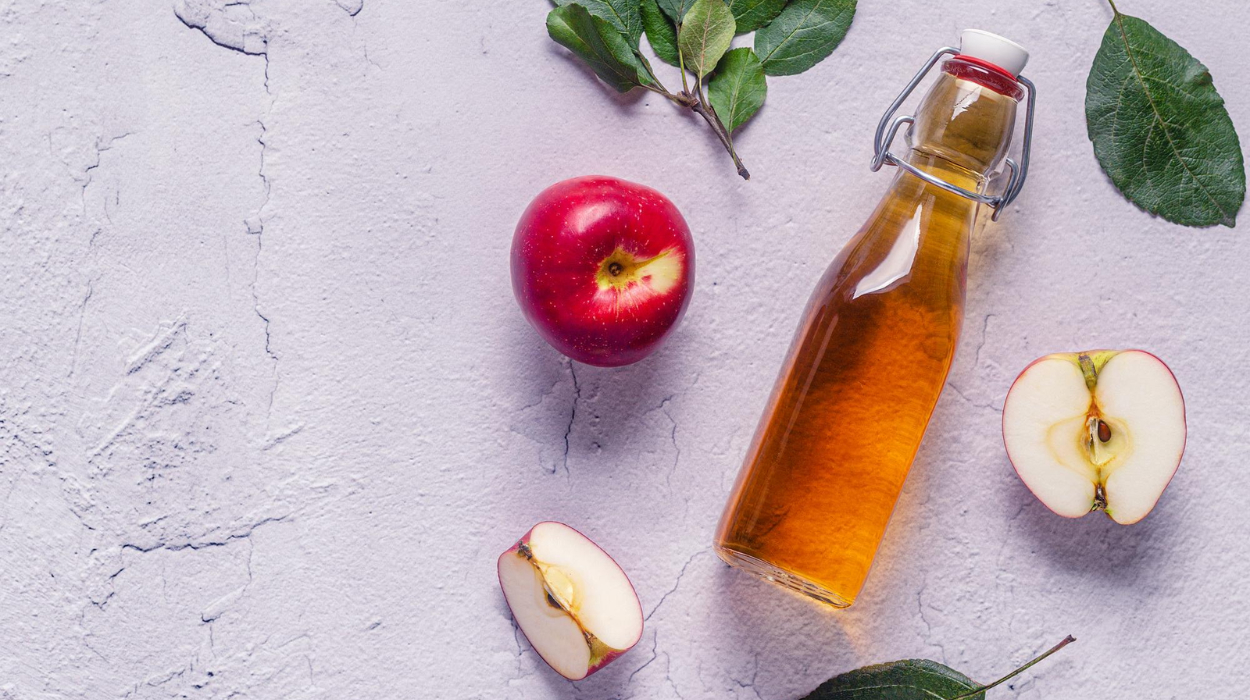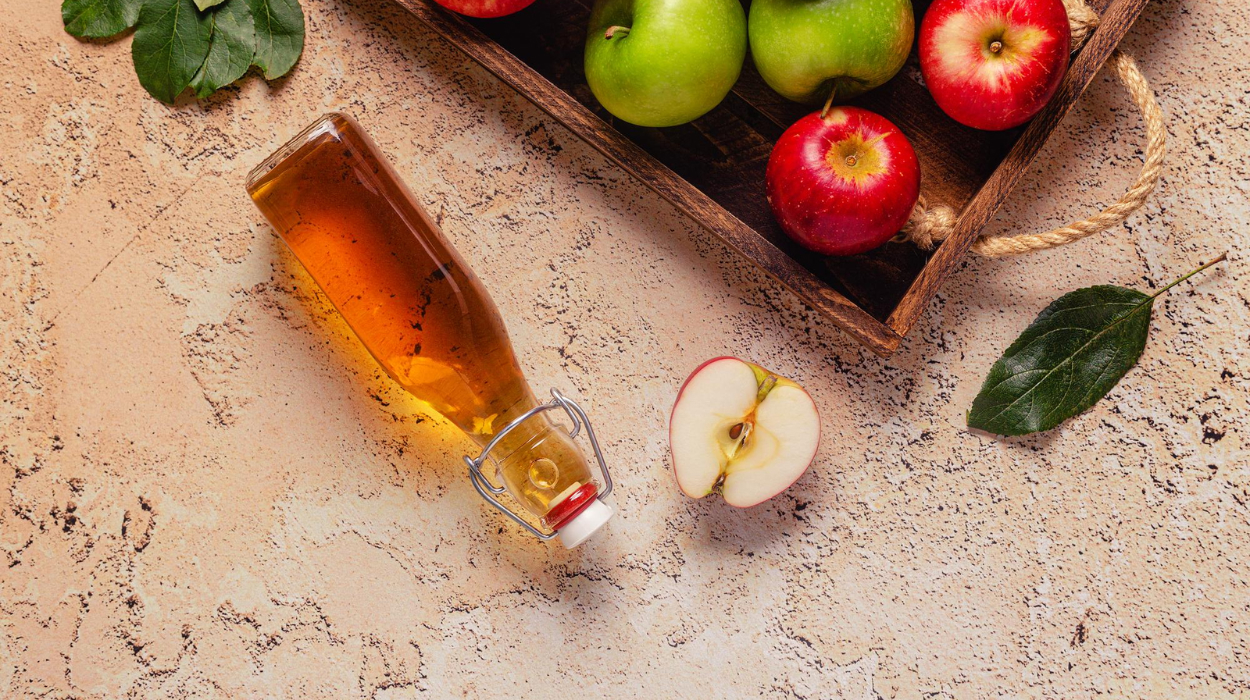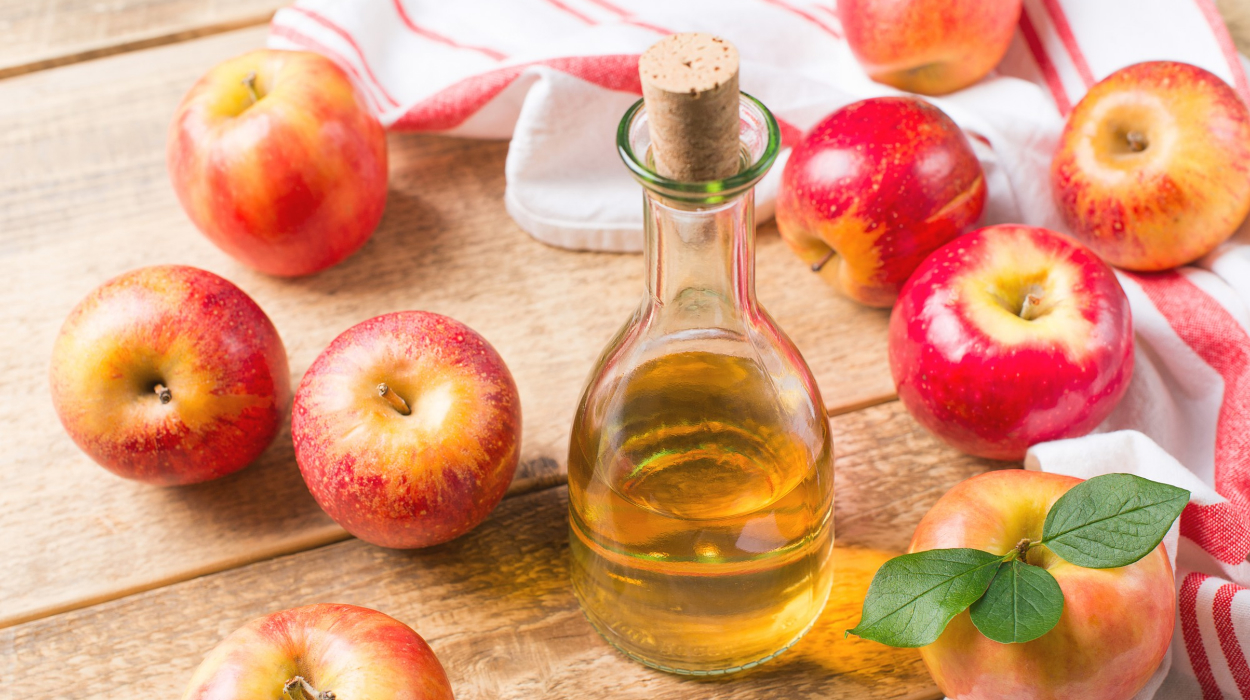People choose alternative and complementary medicine more often now for their healthcare. Many prefer natural or home remedies because they feel it’s healthier. Health-conscious folks want treatment options other than pharmaceutical drugs or therapies.
Apple cider vinegar, or ACV, has been used as a natural remedy for a long time. ACV is made through a process of fermenting apples. It contains natural biological components and essential nutrients providing health benefits.
Apple cider vinegar’s potential health benefits include metabolic, digestive, and women’s health support. Dietary acetic acid like ACV may be helpful for kidney health.[1] Therefore, you may wonder if you can use apple cider vinegar for kidney stone treatment, but always consult a healthcare provider first.
Studies involving ACV demonstrate that it may prevent kidney stones.[2] Continue reading to discover further details about apple cider vinegar and urinary tract health.
Can Apple Cider Vinegar Treat Kidney Stones?
The most current research indicates using apple cider vinegar for kidney stones may be helpful. The natural phytochemicals in ACV may have antioxidant properties that provide anti-inflammatory benefits to the body. These natural compounds may also help reduce and prevent kidney stones.
How Apple Cider Vinegar Helps Treating Kidney Stones

What Is A Kidney Stone?
Kidneys filter fluids in the body. The waste products the body does not need pass from the kidneys through the urinary tract out of the body. If certain minerals are too high in the urine, they can form kidney stones.
Kidney stones consist of different materials depending on the problems occurring in the urinary tract. The most common type is calcium stones[3] with calcium oxalate as the main component in the stones and calcium phosphate as the lesser component. Uric acid, struvite, and cystine[3] are other types of kidney stones.
- Uric acid stones occur most commonly in people who consume too much animal protein containing high amounts of purine,[3] which the body breaks down into uric acid.
- Struvite stones, or magnesium ammonium phosphate stones, are associated with chronic urinary tract infections[3] that occur more often in women than men.
- Cystine stones result from a genetic disorder[3] that impairs normal kidney function.
How Apple Cider Vinegar Helps
Apple cider vinegar is associated with decreasing calcium oxalate, cystine, and uric acid. ACV’s dietary acetic acid has an alkalizing effect[4] on the body, meaning it decreases acidity levels.
People who consume fermented vinegar, e.g. apple cider vinegar, have a reduced chance of developing[4] kidney stones. A pilot study indicated reduced kidney stone occurrence[2] and reoccurrence with daily vinegar intake. These effects may be partly due to ACV-containing polyphenols and other phytochemicals[5] that have antioxidant properties providing anti-inflammatory effects on the body.
Apple cider vinegar contains phenolic acids which protect against oxidative stress caused by environmental and lifestyle factors. Phenolic acids can increase the activity of antioxidant enzymes, which dissolve calcium crystals.[5] These natural compounds may also protect the[1] body from kidney damage.
Therefore, apple cider vinegar may[5] help prevent kidney stones.
Furthermore, laboratory studies suggest that phytochemicals in ACV help dissolve kidney stones consisting of calcium oxalate.[5] Research involving ACV and kidney stones appears promising but further studies are required to determine details and indications of treatment.
How To Take Apple Cider Vinegar For Kidney Stones

Studies show that consuming apple cider vinegar daily may be beneficial for preventing and treating kidney stones. If you have dealt with these intrusive calcium stones then you know they can cause severe pain. Thus, how much apple cider vinegar for kidney stones is enough?
ACV is consumed orally, however, outright drinking apple cider vinegar for kidney stones may not be tolerable for some. Diluted ACV with water appears to be the best way to take it. Some recommend two tablespoons of vinegar in a glass of water, however, there’s no medically agreed-upon dosage currently.
Small stones may easily pass but for larger stones[6] medical intervention may be necessary. If your symptoms include pain in the lower abdomen or an inability to eliminate urine you may need medical treatment. A sign you may be passing a stone would be painful urination or possibly blood in the urine.
Are There Any Side Effects?
There are minimal reports of side effects regarding ACV specific to kidney stones. However, ACV should be consumed in recommended amounts for best results. Apple cider vinegar did not cause side effects when taken daily as directed.[2]
Apple cider vinegar is a probiotic product containing living microorganisms which are a product of the fermentation process. Sometimes they produce biogenic amines[7] which can have harmful effects for some people causing rashes, headaches, or blood pressure changes.
Safety Tips
Although any remedy could cause issues, generally speaking, fermented products are considered safe[7] to consume. Those who may have a sensitivity or allergy to apples should consider avoiding ACV. There are some reports of indigestion with apple cider vinegar, so if you tend toward digestive issues it may be harmful for you.
It is always a good idea to consult a healthcare provider if you take prescription medicine and are considering natural remedies.
How To Prevent Kidney Stones
The formation of kidney stones is a complex process. These hard pebble-like particles can form when there is excess uric acid or minerals in the body, chronic illness, or genetic disorders. To understand how to prevent kidney stones you should be aware of contributing risk factors.
Risk factors[3] for kidney stone formation include the following:
- Lifestyle factors and nutritional choices, e.g., high intake of animal protein and salt, with decreased fiber intake and lacking alkaline foods such as certain vegetables, fruits, and beans.
- Metabolic disorders that cause too much calcium, reduced citrate, or a history of gout.
- Inadequate water intake causing low urine output.
- Reoccurring urinary tract infections.
- Genetic disorders and anatomic abnormalities.
- High blood pressure.
- Obesity.
- Inflammatory bowel disease or other disorders that cause poor absorption in the gastrointestinal tract.
- Certain pharmaceutical drugs.
Another type of natural remedy that may help prevent new kidney stones is citric acid such as lemon juice. A lemon juice[4] regime may be difficult for some to tolerate without added sugar. Conversely, grapefruit juice was found in some studies to raise the risk of kidney stone[8] formation but smaller studies reported the opposite.
Improving Lifestyle Factors
If you want to decrease your risk[9] of getting a kidney stone, plan to work toward managing a healthy lifestyle. Experts stress the importance of drinking plenty of water and leading an active life to[5] prevent kidney stones. This should include eating a plant-filled diet and maintaining a healthy body weight.
Limiting animal protein and high oxalate foods may put a crimp in your normal eating regimen.
Consider improving your fruit and veggie intake with a dietary supplement to make sure you receive adequate nutrition. Increased awareness of your diet may improve your gut health which affects your body’s immune response.
ACV may promote gut health by supporting the microbiome in addition to its association with kidney stone prevention. Some other apple cider health benefits include aiding in lowering cholesterol and weight management support. A healthcare provider may prescribe medication to prevent reoccurrence for those who are more prone to suffer from kidney stones.
Final Thought
Home remedies demonstrate positive effects for some urinary tract health issues. The pain caused by kidney stones can be life-limiting so natural treatments are a plus. Research indicates that apple cider vinegar may support preventing and treating kidney stones.
ACV’s natural phytochemicals such as polyphenols, specifically phenolic acids, can help dissolve these stones leading to reduced kidney stone pain. This is great news for those who are prone to these menacing stones. Medical treatment may be needed to manage larger stones and it is always recommended to consult a healthcare provider when considering natural treatments.
However, lifestyle factors should be addressed to avoid getting or reoccurring stones.
Experts recommend drinking plenty of water, limiting animal protein, increasing your intake of plants that are low in oxalates, and not leading a sedentary life. These are also positive steps to take toward a healthy lifestyle aside from kidney stone problems.
Frequently Asked Questions
No current evidence reports ACV to be harmful to the kidneys when used as directed.
Experts recommend drinking plenty of water as the best way to manage kidney stones.
Two tablespoons of ACV can be taken daily for health benefits including managing kidney stones.
If you have stomach or digestive problems, or allergies to apple products, you should avoid apple cider vinegar.
 Evidence Based
Evidence Based
